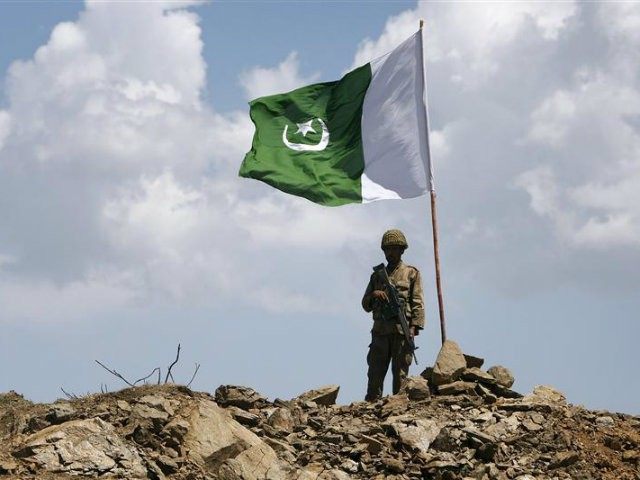Jihadi “sanctuary” Pakistan is “the most influential external actor affecting” stability in Afghanistan and the “outcome” of the U.S.-NATO military mission there, reports the Pentagon as President Donald Trump’s administration considers a tough approach towards Islamabad.
In the Trump administration’s first semi-annual report to Congress on progress in Afghanistan, the Pentagon notes American Gen. John Nicholson, the top commander of U.S. and NATO troops in Afghanistan:
[T]he exploitation of ungoverned sanctuaries outside of Afghanistan by terrorists and Afghan insurgents is the single greatest external factor that could cause failure of the coalition campaign. External sanctuary hampers efforts to bring Afghan Taliban senior leadership to the negotiating table and allows space for terrorist groups like the Haqqani Network to plan coordinated operations against U.S. and coalition forces, the ANDSF [Afghan National Defense and Security Forces], and civilians. External sanctuary allows the Afghan Taliban to rest, refit, and regenerate, thereby perpetuating the cycle of violence.
The Pentagon identifies Pakistan as “the most influential external actor” affecting the ongoing 16-year-old U.S.-led war in Afghanistan.
Haqqani Network jihadists, who have been affiliated with both the Taliban and its ally al-Qaeda, pose the “primary threat” against the U.S. troops and their allies in Afghanistan, said Gen. Nicholson last year.
“Afghan-oriented militant groups, including the Taliban and Haqqani Network, retain freedom of action inside Pakistani territory and benefit from support from elements of the Pakistani Government,” points out the U.S. Department of Defense (DOD) in its assessment released Tuesday:
Although Pakistani military operations have disrupted some militant sanctuaries, certain extremist groups—such as the Taliban and the Haqqani Network—were able to relocate and continue to operate in and from Pakistan. The United States continues to convey to Pakistan at all levels the importance of taking action against all terrorist and extremist groups.
Meanwhile, DOD acknowledges in its report, Pakistan’s regional rival India maintains a good relationship with Afghanistan.
“India is Afghanistan’s most reliable regional partner and the largest contributor of development assistance in the region… India is providing significant training opportunities for Afghan officers and enlisted personnel,” reports the Pentagon.
Pakistan is against “heavy Indian influence” in Afghanistan, testified U.S. Lt. Gen. Vincent Stewart, the chief of the Defense Intelligence Agency (DIA), before an American congressional panel last month.
He noted that Islamabad “holds in reserve terrorist organizations… so that if Afghanistan leans towards India they will no longer be supportive of an idea of a stable and secure Afghanistan.”
“We have to push” Pakistan “to do more against” terrorist organizations in the region, declared Gen. Stewart, adding that the United States must convince Islamabad that “the status quo is not in their best interest.”
Echoing Indian and Afghan officials, the Pentagon has long accused Pakistan of knowingly harboring jihadists organizations launching attacks against U.S.-NATO troops and their local allies in Afghanistan.
According to the U.S. military, the Afghanistan-Pakistan region is home to the largest concentration of terrorist organizations in the world: thirteen in Afghanistan and seven in Pakistan.
Reuters has learned from two U.S. officials speaking on condition of anonymity that the Trump administration is exploring toughening its approach to combating Pakistan-backed terror groups operating in Afghanistan.
“Potential Trump administration responses being discussed include expanding U.S. drone strikes, redirecting or withholding some aid to Pakistan and perhaps eventually downgrading Pakistan’s status as a major non-NATO ally,” the two officials told Reuters.
“Other U.S. officials are skeptical of the prospects for success, arguing that years of previous U.S. efforts to curb Pakistan’s support for militant groups have failed, and that already strengthening U.S. ties to India, Pakistan’s arch-enemy, undermine chances of a breakthrough with Islamabad,” adds the news outlet.
DOD argues that Pakistan continues to serve as a safe haven for the Afghan Taliban and the Haqqani Network.
“Increased collaboration between Afghanistan and Pakistan is critical to maintaining pressure on militant and terrorist groups and for meeting the enduring security requirements on both sides of the shared border,” mentions the Pentagon report. “The trust deficit resulting from Pakistan’s support of and inaction against Afghan-oriented extremists hampers the bilateral military collaboration required to achieve enduring security.”
“Militant groups, including the Taliban and Haqqani Network, continued to utilize sanctuaries inside Pakistan. Pakistan’s belief that Afghanistan is not doing enough to prevent cross-border attacks” it adds, noting that despite tensions between the two nations, Pakistan provided support to U.S.-backed Afghan operations against the Islamic State (ISIS/ISIL).

COMMENTS
Please let us know if you're having issues with commenting.